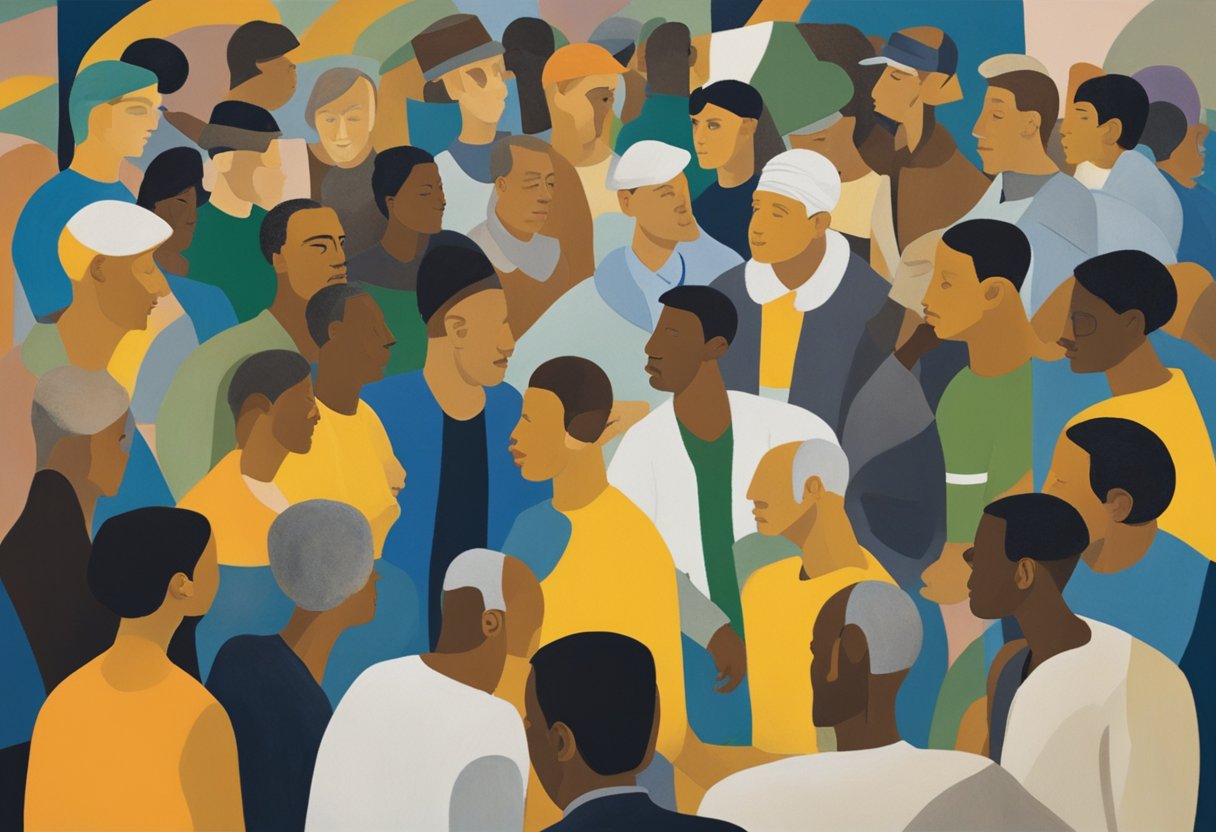A Journey of Resilience
Redefining identity after a cancer diagnosis is a journey that many men, including myself, navigate. As a two-time lymphoma survivor, I understand the challenges firsthand. Cancer doesn’t just change your body; it transforms who you are and how you see the world. Embracing this change can lead to remarkable personal growth and new opportunities, even if the path to get there is difficult.

In the process of surviving, I discovered inner strengths and untapped passions. Male cancer thrivers often face unique struggles but also find unique ways to overcome them. By sharing my story and experiences, I hope to inspire other men to take control of their journeys and redefine their identities confidently and purposefully.
Building a supportive community is crucial. Sharing personal stories and advocating for education and lifestyle changes can uplift others facing similar battles.
It’s about thriving beyond survival and finding a deeper meaning in life.
Key Takeaways
- Rediscovering identity post-cancer fosters growth and new passions.
- Male cancer thrivers can find strength and purpose through unique challenges.
- Building support and sharing stories helps others thrive.
The Male Cancer Experience
Facing cancer as a man involves confronting life-changing realities. This experience brings unparalleled challenges, reshaping identity through diagnosis, emotional upheaval, and the treatment pathway.
Confronting the Diagnosis
When I first heard the words “You have cancer,” a wave of fear and disbelief washed over me. For men, a diagnosis like this can be especially jarring, triggering deep-seated anxieties. Male breast cancer is quite rare, constituting less than 1% of all breast cancer cases in Germany, according to this study. The initial shock often leads to stress, as acknowledging the illness disrupts established norms of masculinity.
The Emotional Journey
The emotional journey through cancer is a tumultuous ride. I have dealt with waves of fear and anxiety. For many men, these emotions are compounded by the societal pressure to remain stoic.
Talking about my feelings helped alleviate some of the stress in my journey. As noted here, concealing emotions, a common strategy, can create internal conflict and exacerbate stress. Embracing vulnerability was essential for my resilience.
Cancer Treatment Trajectory
Cancer treatment for men involves navigating complex medical pathways. My treatment trajectory included surgery, chemotherapy, and constant monitoring. Many men are diagnosed at later stages, which can result in more aggressive and lengthy treatments, as highlighted in this article on men’s lived experiences.
Each step in my treatment required resilience and an unwavering focus on recovery. Engaging in physical activity, maintaining a balanced diet, and joining support groups were crucial to my well-being during this phase.
Thriving Beyond Survival
A cancer diagnosis can prompt survivors to redefine their identity and sense of self. They may embrace personal growth, discover new passions, and develop a more authentic and purposeful way of living.
From Patient to Thriver
When I was diagnosed with lymphoma, the word “survivor” became a part of my identity. However, surviving isn’t just about living; it’s about thriving. Transitioning from a patient to a thriver means focusing on personal growth. I found new passions I hadn’t explored before my diagnosis.
This shift involves setting new goals and embracing health and wellness for many men.
Exercise, balanced nutrition, and mental health care are crucial. Striving to thrive also means looking beyond the illness and finding a new sense of purpose, whether it’s through work, hobbies, or relationships.
Living with No Evidence of Disease
One of the milestones I’m grateful for is achieving No Evidence of Disease (NED). Although it doesn’t always mean complete recovery, it signifies a significant victory.
Living with NED involves ongoing vigilance and care. Regular check-ups and screenings are essential in this new chapter.
Maintaining a healthy lifestyle is vital. I prioritize physical activity and nutrition. Open communication with doctors helps address long-term side effects.
Understanding the long journey ahead encourages me to stay proactive about my health daily.
The Role of Community Support
Thriving beyond survival also depends on the support of a community. Being part of support groups with other male cancer thrivers has been incredibly valuable. Sharing our experiences creates a sense of camaraderie and understanding.
Support groups offer practical advice and emotional comfort, making the journey less isolating. They provide opportunities to learn from others who have faced similar challenges.
Beyond support groups, engaging with broader communities—whether through volunteering or advocacy—helps reinforce the feeling of contributing and making a difference.
Community involvement fosters resilience and a shared purpose, enhancing the quality of life while navigating post-cancer life.
In summary:
- Thriving involves personal growth and new passions.
- Maintaining health while living with NED requires vigilance.
- Community support offers practical advice and emotional comfort.
The Power of Perspective

A cancer diagnosis can prompt survivors to redefine their identity and sense of self. They may embrace personal growth, discover new passions, and develop a more authentic and purposeful way of living.
Shifting Mindsets
After my lymphoma diagnosis, I realized the power of perspective. It shapes how we face challenges.
During treatment, I learned to replace fear with strength. Viewing myself as a thriver, not just a survivor, helped me see new possibilities.
Adopting a positive mindset wasn’t easy. It required daily effort to focus on progress, not setbacks.
I began to appreciate small victories, like completing a round of chemotherapy or enjoying a family meal. These moments, however small, were crucial to maintaining a hopeful outlook.
Perspective also influenced how I saw my body.
Instead of feeling betrayed, I saw it as a resilient vessel. This shift empowered me to take control of my health and wellness journey.
Finding Purpose and Gratitude
Cancer has a way of realigning priorities. I found purpose through advocacy and connecting with others.
Sharing my journey with fellow patients and offering support was immensely fulfilling. This new purpose made the battle worthwhile and infused my life with meaning.
Gratitude became a daily practice. I started journaling, noting things I was thankful for, like supportive friends or a sunny day.
This practice helped me focus on the positives rather than the negatives. It also made me more mindful of the present moment, reducing anxiety about the future.
My sense of gratitude extended to my medical team and caregivers. Their dedication and compassion were life-changing.
Acknowledging their efforts made me feel more connected and supported during my recovery. Gratitude helped me thrive beyond just surviving.
Building a Supportive Environment

Creating a supportive environment involves fostering relationships that provide emotional, practical, and psychological assistance. This includes family and caregivers as well as professional counselors and support groups.
Family and Caregivers
Family and caregivers are crucial in a male cancer thriver’s journey. They provide not only physical care but also emotional support that helps me stay motivated.
My family’s unwavering presence reassures me. Small acts like joining me for doctor visits or simply listening to my concerns make a big difference.
Caregivers often manage practical tasks, from meal prepping to handling medications.
Their involvement allows me to focus on my recovery and daily routines.
Maintaining open communication is vital. I express my feelings and let them know how they can help.
This builds mutual trust, making the cancer journey less daunting.
Professional Counselors and Support Groups
Professional counselors offer an essential outlet for navigating the emotional complexities of cancer recovery. Their expertise helps me process feelings of fear, anger, or sadness.
Support groups specifically geared toward men with cancer provide a unique platform.
In these groups, I connect with others who share similar experiences, which helps me feel less isolated.
Through regular meetings, we discuss coping strategies, share personal stories, and offer advice.
These sessions foster a sense of community and resilience. Knowing that others have faced and overcome similar challenges gives me the strength to keep going.
Education and Advocacy

Understanding your disease and advocating for yourself are crucial steps in your recovery journey. Knowledge, support, and involvement in advocacy efforts can significantly impact your experience with cancer.
Learning About Your Disease
When diagnosed with cancer, knowing what you’re up against is essential. Educating yourself about the specifics of your illness empowers you to make better decisions.
I recall feeling overwhelmed when I first faced lymphoma. However, learning the medical terms, treatment options, and survival statistics gave me a sense of control.
National resources, like the American Cancer Society, offer valuable tools and information. They provide detailed guides about various cancers, treatment approaches, and side effects.
The knowledge I gained from these resources helped me understand what to expect. Speaking with my healthcare team regularly also made a difference.
Personal research and participating in support groups can offer insights you might not find on your own.
Group settings provide a space to share experiences and learn from others in similar situations. This kind of communal learning can be incredibly supportive.
The Importance of Advocacy in Recovery
Advocating for yourself does not just mean asking questions at the doctor’s office; it involves fighting for better care and resources.
When I went through my second bout with lymphoma, I noticed that many men struggle to find their voice in medical settings. Self-advocacy became my tool for ensuring I received the attention and resources I needed.
Supporting advocacy groups focusing on men’s health can amplify your efforts, raising awareness about issues specific to male cancer thrivers.
Organizations like CancerCare offer specialized programs that address the unique challenges men face.
Engaging in advocacy also opens up opportunities to participate in research initiatives to improve treatment and recovery for everyone.
By sharing my journey, I contributed to studies that might one day make the road smoother for those who follow. Encouraging others to advocate for themselves creates a robust, informed community that can drive change and improve outcomes.
Lifestyle Changes and Well-Being
Facing cancer can lead men like me to reevaluate our lives. Embracing healthier habits and finding ways to cope mentally can improve well-being and aid healing.
Adopting Healthy Habits
After my lymphoma diagnosis, I committed to changing my lifestyle.
Quitting smoking became the first step, as smoked tobacco is linked to many cancers.
Eating a balanced diet rich in fruits, vegetables, and lean protein helped me feel more energized and strong.
Staying active also played a crucial role in my recovery.
I took up activities such as swimming and yoga, which built my endurance and reduced stress.
Regular check-ups and screenings are vital. These help catch any signs of recurrence early, allowing for timely intervention.
Surrounding myself with supportive friends and family provided the emotional boost I needed to keep going.
Mental Health and Coping Strategies
Dealing with cancer impacts your mental health. I found it essential to address my emotional well-being alongside my physical health.
Joining a support group for male cancer survivors helped me connect with others facing similar challenges. These interactions offered a sense of community and shared understanding.
Therapy also became a part of my routine, helping me process my feelings and fears.
Techniques such as mindfulness and meditation helped in managing anxiety and staying present.
I also pursued hobbies that brought joy and relaxation, like painting and listening to music.
Even in tough times, maintaining a positive outlook made a significant difference. Setting small, achievable goals helped me stay focused and motivated throughout my healing journey.
Personal Stories and Sharing

Living through cancer reshaped my understanding of identity and how sharing stories can create connections. Through personal tales, the strength found in shared experiences among male cancer thrivers becomes evident.
Voices of Male Cancer Thrivers
As a double lymphoma cancer survivor, I have seen the power of shared stories in building a solid support network.
Men often face unique challenges and may initially feel isolated or reluctant to discuss their experiences. Sharing our journeys helps break down these barriers.
Personal stories from male cancer thrivers can provide motivation, practical advice, and emotional support.
Hearing from others who have fought similar battles validates our struggles and triumphs.
Whether it’s tips on managing side effects or coping with the mental impact, the shared knowledge is invaluable for those on a similar path.
The Significance of Sharing Experiences
Sharing my cancer journey was a turning point in my recovery.
By opening up, I connected with other survivors and cultivated a community of understanding and support.
This exchange of experiences strengthened my resilience and provided insights that I couldn’t have found alone.
Men often find it challenging to express vulnerability, yet sharing our cancer experiences breaks down emotional barriers and fostered connection.
This sharing is therapeutic for us and serves as a beacon of hope for newly diagnosed cancer patients searching for solidarity and assurance.
The empowerment from openly discussing our experiences cannot be overstated. It helps us recognize that, though complex, survivorship is filled with opportunities for personal growth and newfound purpose.
The Debate

A cancer diagnosis changes how men see themselves. Many men struggle with the identity of a cancer patient. When I first got diagnosed, I felt like I had lost who I was.
Some people feel these terms, like survivor, thriver, or fighter, can be empowering. It helped me feel strong and motivated as I battled lymphoma. But not everyone feels the same way.
Some men see these labels as limiting. They feel that such terms don’t capture the full story of their experience.
I came across an insightful article on Psychology Today stating that assuming everyone identifies with these terms can minimize their struggle.
There’s also the pressure to stay positive. Being seen as a strong fighter sometimes makes men feel they can’t show their true feelings. It’s a tricky balance between staying strong and being honest about the pain.
Moreover, identity shifts are standard.
As noted in the Washington Post, the identity of a cancer patient can force a man to pause and see life differently. It can be a hard transition, making it difficult to know who you are outside this diagnosis.
Adding to the complexity is the mental health aspect.
Fraser Smith’s TED Talk explores the crisis of male identity, especially when dealing with ideas of masculinity.
It talks about how traditional views can impact men’s mental health during and after cancer.
Navigating this debate in my journey meant balancing embracing the strength I gained and allowing myself to feel vulnerable.
We need more support systems that acknowledge these different perspectives.
Final Thoughts
After facing lymphoma twice, I’ve learned that a cancer diagnosis can change a man’s life in profound ways.
It’s a journey that pushes us to redefine who we are. Many of us find new strengths and passions during this time.
I started to view my health in a new light. This experience isn’t just a fight; it’s a path to personal growth.
Key aspects to focus on:
- Emotional Well-Being: Prioritize mental health. Talking openly about feelings can be a huge relief.
- Physical Health: Staying active helps rebuild and maintain strength. Simple activities like walking or light resistance training can be a great start.
- Community Support: Connect with others who have faced similar challenges. Shared experiences build a strong support network.
| Area | Action |
|---|---|
| Mental Health | Join a support group. Speak to a therapist. |
| Physical Health | Start light exercises. Consider yoga or swimming. |
| Social Support | Lean on friends. Attend cancer survivor meetups. |
Helping others has been a massive part of my journey. When I share my story, I hope it inspires other men to find their path forward.
A cancer diagnosis doesn’t have to define you. It can be a turning point for rediscovering personal strengths and creating a more fulfilling life. -T
Frequently Asked Questions
A cancer diagnosis can prompt survivors to redefine their identity and sense of self. They may embrace personal growth, discover new passions, and develop a more authentic and purposeful way of living.
How can survivors psychologically cope with life after cancer?
Psychological coping involves accepting the changes and finding new ways to thrive.
Speaking with a therapist trained in cancer recovery can help navigate these emotional shifts.
Supportive communities also offer a platform to share experiences and gain strength from others who have faced similar battles.
What lifestyle changes are recommended for increasing long-term survival odds?
Regular physical activity is crucial. You can do activities like brisk walking or lightweight training. A balanced diet with plenty of vegetables, fruits, and lean proteins helps maintain good health. Avoiding smoking and limiting alcohol can further enhance long-term survival odds. It would help if you discussed specific changes with a healthcare provider for personalized guidance.
How does overcoming cancer change a person’s perspective on life?
Overcoming cancer reshapes how I view life, emphasizing gratitude and determination. Many survivors, including myself, find new meaning in everyday moments and strive to live more authentically. This journey often fosters personal growth, deeper connections, and a renewed focus on what truly matters.
What are effective strategies for dealing with the fear of cancer recurrence?
Dealing with the fear of recurrence involves staying proactive. Regular check-ups with healthcare professionals ensure timely intervention if needed. Mindfulness practices like meditation and yoga can help manage anxiety. Joining a community of survivors also provides emotional support from those who understand these fears.
Which supportive communities exist for individuals who have experienced cancer?
Supportive communities like CancerCare and local support groups offer resources and connections. They provide a space to share stories, receive advice, and feel understood. Online forums and social media groups also provide instant support and access to a broader community of survivors.
In what ways can family and friends support a loved one’s new sense of self post-cancer?
Family and friends can support by offering patience and understanding. Encouraging open conversations about new priorities and emotions helps.
Attending support group sessions together can also be beneficial. Small gestures, like joining a healthy lifestyle or respecting their need for self-reflection, can significantly affect their journey.
